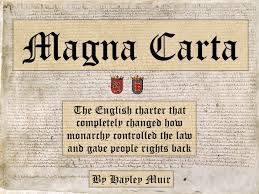
Hand of King John of England
(1166 - 1216) forced into signing
document reducing his power
reigning reins of King from
old English laws prevailing
before Norman conquest, a collection
of 37 English laws drafted
by Archbishop Stephen Langton.
Barons of England and King John
approved document in meadow
at Runnymede in Egham, Surrey,
South England (between Windsor
and Staines) originally called
'Articles of the Barons' on June
10, 1215 which Oath of Fealty
presented to King John on June
15, 1215 produced formal royal grant,
based on agreements reached at
Runnymede, which became
known as Magna Carta considered
founding document of English
liberties and hence American
liberties influence of Magna Carta
seen in United States Constitution
and the Bill of Rights. Article 21
from Declaration of Rights in
Maryland Constitution of 1776 reads:
"That no freeman ought to be
taken, or imprisoned, or disseized
of his freehold, liberties, or privileges,
or outlawed, or exiled, or in
any manner destroyed, or deprived
of life, liberty, or property, but by
the judgment of peers, or
by the law of the land."
Unprecedented basic human rights
produced roiling contention.
In 1205 King John quarreled with
Pope Innocent III about who should
be archbishop of Canterbury.
The Pope wanted a man named
Stephen Langton to be archbishop.
King John swore he should never come
to England. In 1209 the pope
excommunicated King John
and banned all church services
in all parish churches.
King John acquiesced. Pope
Innocent made the king
and people pay him money
upon request. Taxes levied
by King John exorbitant. In
1212 King John taxed Barons
in attempt to regain lost lands
of Aquitaine, Poitou
and Anjou. King John quarrels
with Barons over his methods
of ruling England. Barons and
Stephen Langton decided to limit
King and make him govern by old
English laws that prevailed before
the Normans came. The demands
of Barons were documented in 'Articles
of the Barons' in January 1215.
Barons took up arms against
King John. Barons captured
London in May 1215.
In June the Barons took King
John by surprise at Windsor.
He agreed to a meeting at Runny
mede. King John signed and
sealed the document on June
10, 1215.The barons renewed
Oath of Fealty to King John
on June 15, 1215.
The royal chancery produced
formal royal grant, based on
agreements reached at Runny
mede, which became known
as Magna Carta. King John
had no intention abiding by
Magna Carta. His duplicity
leads to Barons War
between 1215 - 1217. The
rebel barons support son king
of France, Prince Louis in
preference to King John.
In 1216 Prince Louis invades
England marches to London
where he receives support
and proclaimed King of England
(although not actually crowned).
King John dies in October.
The Barons turn on Prince
Louis and supports the nine
year old son of King John
who then became King
Henry III of England.
Reviews
No reviews yet.
